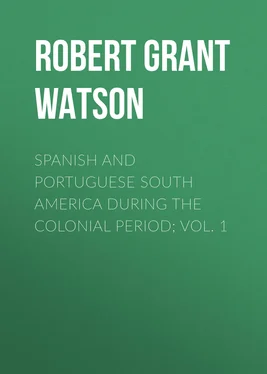Robert Grant Watson - Spanish and Portuguese South America during the Colonial Period; Vol. 1
Здесь есть возможность читать онлайн «Robert Grant Watson - Spanish and Portuguese South America during the Colonial Period; Vol. 1» — ознакомительный отрывок электронной книги совершенно бесплатно, а после прочтения отрывка купить полную версию. В некоторых случаях можно слушать аудио, скачать через торрент в формате fb2 и присутствует краткое содержание. Жанр: foreign_prose, История, foreign_edu, foreign_antique, на английском языке. Описание произведения, (предисловие) а так же отзывы посетителей доступны на портале библиотеки ЛибКат.
- Название:Spanish and Portuguese South America during the Colonial Period; Vol. 1
- Автор:
- Жанр:
- Год:неизвестен
- ISBN:нет данных
- Рейтинг книги:5 / 5. Голосов: 1
-
Избранное:Добавить в избранное
- Отзывы:
-
Ваша оценка:
- 100
- 1
- 2
- 3
- 4
- 5
Spanish and Portuguese South America during the Colonial Period; Vol. 1: краткое содержание, описание и аннотация
Предлагаем к чтению аннотацию, описание, краткое содержание или предисловие (зависит от того, что написал сам автор книги «Spanish and Portuguese South America during the Colonial Period; Vol. 1»). Если вы не нашли необходимую информацию о книге — напишите в комментариях, мы постараемся отыскать её.
Spanish and Portuguese South America during the Colonial Period; Vol. 1 — читать онлайн ознакомительный отрывок
Ниже представлен текст книги, разбитый по страницам. Система сохранения места последней прочитанной страницы, позволяет с удобством читать онлайн бесплатно книгу «Spanish and Portuguese South America during the Colonial Period; Vol. 1», без необходимости каждый раз заново искать на чём Вы остановились. Поставьте закладку, и сможете в любой момент перейти на страницу, на которой закончили чтение.
Интервал:
Закладка:
Pedrarias, on the day of his arrival, summoned Vasco Nuñez to his presence and held with him a long private conference, at which the historian Oviedo assisted. In accordance with the governor’s request, Vasco Nuñez gave an account in writing, in the course of two days, of his administration during the past three years. He likewise described the rivers and mountains where he had found gold, the caciques who were his allies, and his journey to the Southern Sea and to the Isle of Pearls. Having thus obtained the information which he required, and which Nuñez alone could furnish, Pedrarias next proceeded to take the residencia of the late captain-general, that is to say, he instituted an inquiry into his past conduct, the result being that for the injuries done to Enciso and others, Nuñez was condemned to pay a large amount, although he was acquitted of the criminal charges brought against him. The governor was now his declared enemy, and would have sent him in chains to Spain, to be tried for the death of Nicuesa, had he not been warned by the Bishop Quevedo, who was Nuñez’ friend, that his arrival in Spain would be the signal of his triumph, and that the result would in all probability be his return to Panamá with increased power and position. Nuñez had likewise found an advocate in the wife of the governor, who could not but admire his character and exploits. Under these circumstances it was thought better to detain him at Darien under a cloud. His property, which had been sequestrated, was, however, restored to him.
Nuñez, in his letter to the king, had advised the creation of settlements in the territories of Comagre, Ponca, and Pocorosa, with a view to establishing a line of posts across the mountains between Darien and the Southern Sea; and it was now determined to carry out this plan. Whilst preparations were being made with this view, the Spaniards who had accompanied Pedrarias began to suffer greatly from the effects of the climate, and were likewise sorely pressed by hunger. The colony had not been in any way prepared for such an accession to its numbers; nor were there any neighbouring friendly Indians on whom to fall back for a supply of provisions. Men brought up in luxury, and who were clad in fine raiment, were glad to procure herbs and roots, or were actually perishing from starvation. One of the principal hidalgos dropped down dead in the street, starved. Within a month’s time seven hundred men had perished, whilst Pedrarias himself was taken seriously ill. The provisions which had been brought out were now exhausted, and the horrors of famine stared the whole colony in the face. In this gloomy state of affairs Pedrarias was glad to give permission to a ship-load of starving adventurers to depart for Cuba and for Spain.
When the governor had recovered from his malady, he urged on the expeditions which he had planned; but he was careful not to permit Vasco Nuñez to acquire additional renown by taking part in them. That cavalier was still allowed to remain under the cloud of a judicial inquiry hanging over him. Notwithstanding the provision which had been made not to admit lawyers into the colony, the legal profession was at this time so flourishing at Darien that it was estimated that there were about forty lawsuits to each colonist.
Vasco Nuñez, oppressed by this inaction, determined to prosecute his plans on his own account, without reference to the governor; and he despatched one Garabito to Cuba to enlist men for an expedition across the mountains and to found a colony on the Southern Sea. Whilst Garabito was absent, Nuñez was condemned to behold his schemes ruined, owing alone to the incapacity and brutality of those entrusted by Pedrarias with the mission of carrying them out. Amongst the leaders employed by the governor was one Juan de Ayora, who was sent with four hundred men to build forts in the countries ruled over by Comagre, Pocorosa, and Tubanamá respectively. This officer proved himself an exceptional ruffian even amongst the Spanish transatlantic adventurers of the day. According to Oviedo, who was at this time notary of the colony, he not only demanded of the chiefs and their subjects the authorised requisitions to avert war, but, pouncing upon the caciques and principal men by night, he put them to the torture in quest of gold. Some he then caused to be put to death; others were given to be devoured by the dogs; whilst others again were reserved for new forms of torment. Their wives and daughters were taken from them, and were made slaves and concubines according to the good pleasure of this Ayora.
One of the first victims of this expedition was Comagre himself, the same youthful cacique who had given to Vasco Nuñez the earliest information of the existence of the sea beyond the mountains, and who had told him that a thousand men would be needed for its discovery. Little did he imagine that he himself would be one of the victims of the thousand men who had now been brought by his advice! The chiefs with whom Vasco Nuñez had cemented a friendship came forth in turn to lay their gold before Ayora. The valiant Tubanamá, being of a less submissive turn of mind, took to arms, but to no avail. Another cacique , having put his women and children in safety, laid wait in ambuscade and attacked the Spaniards, wounding Ayora himself.
The proceedings of Ayora towards another cacique are thus described by a lawyer sent on a mission of inquiry to the West Indies a few years later by Cardinal Ximenes. On the approach of the Spaniards, the cacique in question, under the belief that he was about to welcome his old friend Nuñez, had prepared for him the best entertainment within his means, including roast-meat, game, and wine. On his inquiring for the chief, Ayora was pointed out to him, but he replied that this was not Nuñez. He was, however, to become well acquainted with his present guest during their brief intercourse. After having partaken of his hospitality, Ayora sent for him and demanded gold. This not being forthcoming in sufficient quantity, the cacique was bound, upon which his vassals were desired by him to bring all the gold in their possession. The amount, however, did not satisfy the invader, who ordered the cacique to be burnt alive. 7 7 Navarrete.
Not being troubled as to the means he took to obtain it, it was but natural that this scoundrel should gather together a considerable quantity of gold; it is some satisfaction to the moral sense to know that neither Ayora nor any one else was any the better for it. The idea of delivering up his ill-gotten treasures was repugnant to the avarice of this robber, who secretly made off with them to sea and was never more heard of. The colony which he had founded at Santa Cruz met with no better fate. The garrison, having given much offence to the Indians, were beset at night by Pocorosa and his people; a desperate struggle ensued, but when morning broke, only five Spaniards were left alive to carry the tale to Darien . It may here be mentioned that Hurtado, who had been sent by Pedrarias to discover the causes in the delay of the return of Ayora, brought back with him to Darien a hundred peaceful Indians, of whom he disposed as slaves. A number of these had been lent to him as carriers by the cacique Careta, the friend and ally of Nuñez.
1515.
In a letter addressed to Vasco Nuñez, King Ferdinand expressed his high sense of his merits and services, and constituted him Adelantado of the Southern Sea, and governor of the provinces of Panamá and Coybá . He was, however, to be subordinate to Pedrarias. A letter was likewise written at the same time to the latter, informing him of this arrangement, and requiring him to consult with Vasco Nuñez upon all affairs of importance. This communication was a severe blow to the vanity of the jealous old man; and upon its receipt, he summoned a council to deliberate as to what action should be taken. It was finally arranged that the above-mentioned titles and dignities should be nominally conferred upon Nuñez, but that for the meantime he was not to enter into possession of the territories assigned to him.
Читать дальшеИнтервал:
Закладка:
Похожие книги на «Spanish and Portuguese South America during the Colonial Period; Vol. 1»
Представляем Вашему вниманию похожие книги на «Spanish and Portuguese South America during the Colonial Period; Vol. 1» списком для выбора. Мы отобрали схожую по названию и смыслу литературу в надежде предоставить читателям больше вариантов отыскать новые, интересные, ещё непрочитанные произведения.
Обсуждение, отзывы о книге «Spanish and Portuguese South America during the Colonial Period; Vol. 1» и просто собственные мнения читателей. Оставьте ваши комментарии, напишите, что Вы думаете о произведении, его смысле или главных героях. Укажите что конкретно понравилось, а что нет, и почему Вы так считаете.












